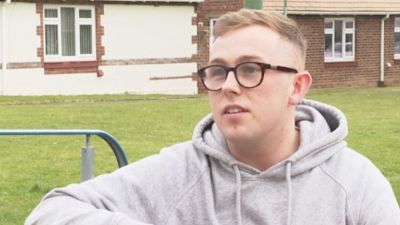The County Durham man helping others with mental health support after losing his brother to suicide

Video report by James Webster.
A man from County Durham has opened up about his experiences of losing his brother to suicide - and how that has motivated him to show others that there is mental health support available.
In 2005, when Matthew Smith was just 10 years old, his brother Daniel had taken his own life.
Matthew said: "One day we'd gone shopping, it was a bank holiday Monday, came back late in the day. My mam started screaming upstairs and my dad went up and I could just hear them shouting Daniel.
"So then I ran upstairs, went into my mam and dad's room in their en suite and seen that Dan had taken his own life."
Matthew added: "I should have had my first pint with my brother. I should have been able to take him driving and when I passed my test and there's all these things that I should have had, that I feel have been taken away from me.
"It's not Dan's fault. I understand that it's not Dan's fault because he was in a place that was clearly too difficult for him to manage."
18 years have now passed, and Matthew feels sure that if his brother had had the right person to talk to, he would still be here.
New research shows that this is less than the 51% in urban areas.
According to Samaritans, the three main barriers are said to be:
Stigma around mental health
Not knowing who to turn to
Not knowing what support there is
After the death of his brother, Matthew also set up a charity 'If U Care Share' which aims to prevent suicide and support families who are affected.
Each year, they get football clubs around the country to wear their kit inside out as part of ‘Inside Out Day’ - among them is Hartlepool United and Sunderland.
Matthew said: "Football played a huge part for me and Dan but I understand the ability that football has to start conversations and it has a platform that can change so many lives and being able to utilise our message and work in partnership with these huge football clubs is a massive thing for us."
And while the need for men to talk is important in Matthew's experience, he says that's not always enough: "I think we're getting better, but I think still we just stand from the outside and say, you need to talk more.
"Actually, it needs to be a collective effort. We need to listen more. We need to get better at listening to what people are going through and create an environment where people feel they can talk.'
If you are experiencing mental health struggles, please reach out for support. Here are some charities which can help you access mental health services: